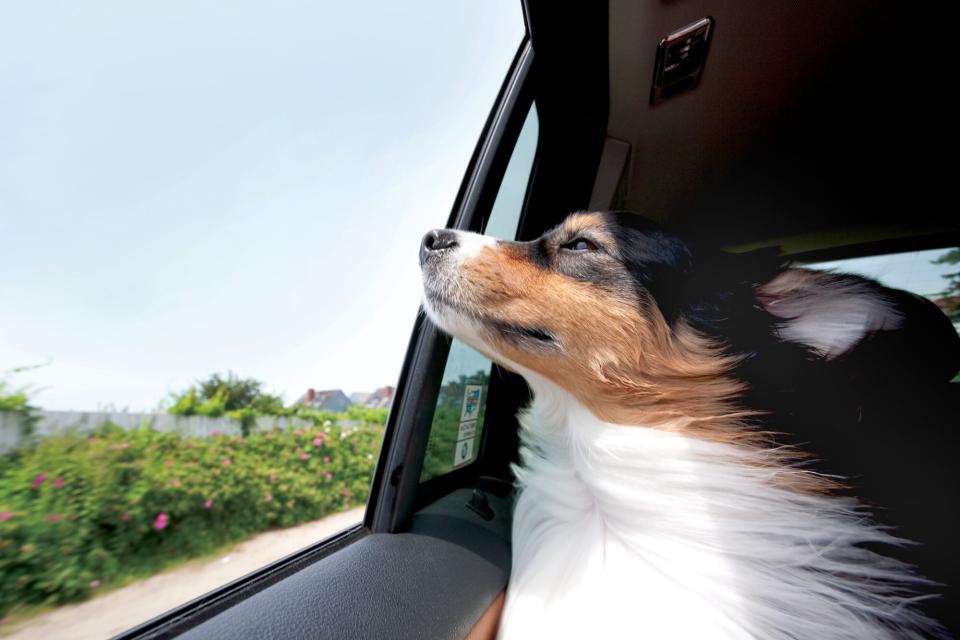Three Ways to Help Your Dog with Car Anxiety and Motion Sickness
Road-tripping with the family helps to foster lifelong memories, which is why so many households hit the open road with their beloved dog in tow. But just like humans, dogs can experience car sickness and anxiety during the ride. Dr. Krista Miller, DVM, a veterinarian at THRIVE Affordable Vet Care in Baton Rouge, Louisiana, says their brains have an area called the chemoreceptor trigger zone (CTZ) that can trigger nausea and vomiting. "This nausea and vomiting along with anxiety are often experienced on car rides, as dogs tend to spend most of their time not in a mobile setting," she notes.
Dr. Walter F. Burghardt, Jr., DVM, PhD, DACVB, a board-certified behavioral veterinarian at BluePearl Specialty and Emergency Pet Hospital in San Antonio, Texas, adds that your beloved pet could be distressed due to apprehension or uncertainty about what the ride actually means. "For example, some dogs learn that car rides tend to be associated with unpleasant experiences—perhaps a visit to an emergency hospital after an injury," he explains. "Distress often is accompanied by increased physiological arousal—increased heart rate, breathing, and activity. Heightened arousal and distress may worsen motion sickness, and vice versa."
Before you pack the entire family—including your pup—into the car for a road trip this summer, consult our veterinarian-approved tips to help you care for your dog if they are experiencing car anxiety or sickness.
Related: The Most Effective Natural Home Remedies for Your Pet

Chris Becker Photo / Getty Images
Socialize your dog to rides in the car.
The first step when battling both motion sickness and anxiety during a car ride is to plan as much as possible in advance. "For all pets, making car travel a fun and safe activity early in life can often avoid problems later," says Dr. Burghardt. "After a problem has developed, it is also a great time to discuss the issue with a vet—medications and a program of desensitization (making travel more familiar) and counter-conditioning (making travel a fun and rewarding experience) can often help make travel a better experience for both pets and their owners." Otherwise, you can practice car conditioning, which includes "sitting in the car with [your] pet, more frequent car rides, [and] anything that allows pets to become more accustomed to a vehicle," adds Dr. Miller.
Ease anxiety with therapy and pre-ride practices.
A common veterinary practice to help your pet keep calm is anti-anxiety therapy. "These treatments range from nutritional supplements designed to reduce mild to moderate chronic distress to long-term medications for more severe cases and even short-acting anti-anxiety medications that can be used just for distressing situations," explains Dr. Burghardt. "Often, these treatments are used in combination with behavioral modification to teach pets that travel can be a rewarding experience."
As for what you can do to help your dog? Dr. Miller suggests giving them candied ginger about 30 minutes to one hour before car travel, which can reduce sensations of pain. She also says to avoid feeding your pet anything too heavy anywhere from four to six hours before a car ride, as this can help lessen an upset stomach.
Consider medication options.
"There are a number of medication choices for motion sickness, the most common being over-the-counter antihistamine products that also produce some sedation and more-specific anti-nausea medications, like Maropitant," says Dr. Burghardt. There are popular prescription medicines, too, like Meclizine. Dr. Miller adds notes that veterinarians can prescribe medications like trazodone and even alprazolam to help with car travel anxiety. No matter the medicine type, she explains that you should always consult with a veterinarian before giving any doses to your dog.

